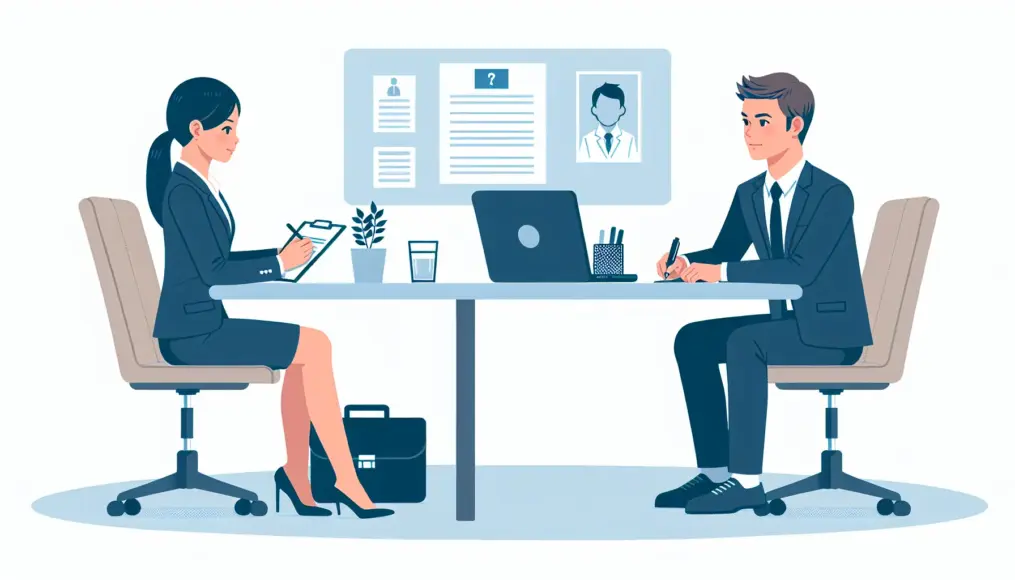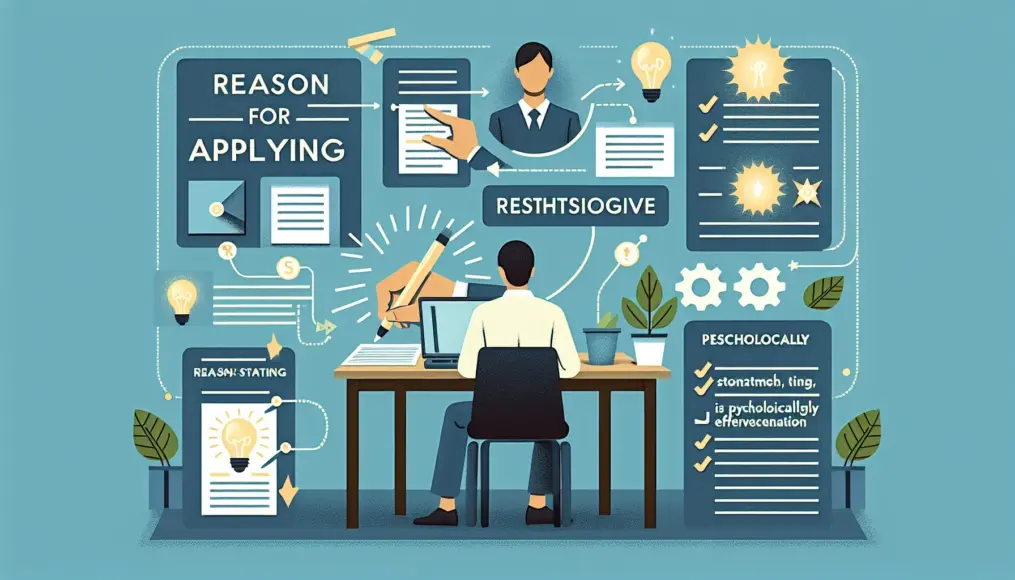If you’re considering a career change to an office position, how’s your interview prep going? Office job interviews often come with their own set of unique questions. Understanding how to respond to these inquiries is the first step toward success. In this article, we’ll dive into common questions you might face in an office job interview, the reasoning behind them, and how to craft effective responses.
We’ll also focus on the skills and experience interviewers are looking for, as well as how to effectively showcase your qualifications. By the end of this read, you’ll likely feel more confident stepping into that interview room. Let’s explore the secrets to successfully transitioning into an office job!
- Understand common questions asked in office job interviews and their intent
- Learn about the skills and experience required, along with tips for self-promotion
- Discover the importance of asking questions in interviews, complete with effective examples
Common Questions Asked in Administrative Job Interviews
When it comes to interviews for administrative positions, there are specific questions that often come up. These questions serve not only to gauge a candidate’s skills and experience but also to assess their suitability for the role and their personality. Before stepping into the interview room, it’s crucial to understand what kind of questions you might face and the intentions behind them. This way, you can effectively highlight your strengths.
By considering what the interviewer is hoping to learn through their questions, you can tailor your responses accordingly. Incorporating specific anecdotes from your experiences can help you provide more impactful answers. In this section, we’ll delve into the common questions in administrative interviews, their underlying intentions, and how to answer them effectively.
Understanding the Intent Behind the Questions
In administrative interviews, questions like “Why did you choose this profession?” or “How can you leverage your past experiences in this role?” are commonly asked. These inquiries aim to assess the candidate’s understanding of the job and their vision for the future. To respond appropriately, it’s important to first clarify your own feelings about the position.
Moreover, by grasping the intent behind the questions, you can prepare answers that meet the interviewer’s expectations. By being ready to showcase skills and experiences unique to administrative roles, you’ll be able to provide more specific responses that leave a positive impression.
- Understand what the interviewer wants to learn through their questions
- Reflect on your feelings and experiences related to the profession
- Prepare to specifically highlight your skills and experiences
Key Points for Responding
There are several key points to keep in mind when answering questions in an administrative interview. First and foremost, incorporating specific anecdotes is essential. Sharing how you acted in particular situations can demonstrate your actual skills. Additionally, don’t forget to highlight your growth and what you’ve learned through these experiences.
It’s also important to keep your answers concise. Overly lengthy explanations can distract the interviewer. Aim to communicate clearly and effectively in your own words while hitting the main points. This approach will facilitate better communication with the interviewer and help you leave a lasting positive impression.
- Use specific anecdotes in your responses
- Highlight your growth and learning experiences
- Keep answers concise and communicate clearly
Skills and Experience Employers Are Looking For
When it comes to interviews for administrative positions, candidates’ skills and experience are highly prioritized. Interviewers seek to determine whether applicants possess the necessary abilities to ensure smooth operations. Therefore, it’s crucial for candidates to clearly communicate their skills and how their past experiences can be applied to the job. This section will delve into the essential skills required for administrative roles and how to effectively promote past experiences.
In administrative positions, communication skills, time management, and problem-solving abilities are vital. By illustrating these skills with concrete examples, candidates can effectively demonstrate their suitability to the interviewer. Additionally, it’s important to clarify how past experiences relate to these skills.
Essential Skills for Administrative Roles
The skills required for administrative positions are diverse, but some of the most critical include the following. First and foremost, communication skills are indispensable. Being able to convey information effectively is crucial for collaboration within the team and interactions with clients. Next is time management. Given the variety of tasks involved, prioritizing and managing work efficiently is essential.
Moreover, problem-solving skills are also important. The ability to respond quickly and appropriately to various challenges that arise during work is necessary. If candidates can showcase these skills through specific examples, they are likely to leave a strong impression on interviewers.
- Communication skills are essential
- Importance of time management abilities
- Demonstrating problem-solving skills through concrete examples
Leveraging Past Experience
To leverage past experiences effectively, candidates need to organize how these experiences relate to the administrative role. For instance, mentioning initiatives taken to improve processes in previous jobs or successful customer interactions can showcase actual skills in action. It’s essential to convey to interviewers how these specific stories illustrate the relevance of one’s experience.
Additionally, reflecting on past experiences and considering the lessons learned can be beneficial. Highlighting not only successes but also the insights gained from failures can be a strong selling point. This approach demonstrates personal growth and can leave a positive impression on interviewers.
For those looking to gain deeper insights into leveraging past experiences, we recommend checking out this article: “Ace Your Job Interview! Tips for Answering Questions and Unexpected Points”. It offers effective ways to respond to interview questions and tips for asking reverse questions to leave a good impression. Packed with useful information for interview preparation, it’s definitely worth a read.
- Organizing past experiences to relate to administrative roles
- Citing specific success stories or improvement initiatives
- Emphasizing learning and growth is crucial
How to Effectively Promote Yourself in Office Job Interviews
In office job interviews, self-promotion is a crucial element. Clearly communicating your strengths and experiences can leave a positive impression on your interviewers. However, it’s not just about bragging; you need to present compelling and specific content that resonates with them. In this section, we’ll explore effective self-promotion strategies tailored for office positions.
Use Specific Examples to Showcase Your Skills
One of the most effective ways to promote yourself is by using specific examples. For instance, discussing your initiatives for process improvements at previous jobs or achievements your team accomplished can clearly demonstrate how you can contribute. Incorporating numbers and results into these examples adds to their persuasive power.
Additionally, it’s essential to highlight your skills and characteristics through concrete stories. When showcasing your communication skills, for example, refer to specific interactions or successful cases that illustrate how you put those abilities into practice. This helps interviewers visualize your capabilities and gives them a clearer picture of what you can offer.
- Use specific stories to promote yourself
- Enhance your credibility by including numbers and results
- Demonstrate your skills with concrete examples
Tips for Communicating with Confidence
Conveying your self-promotion with confidence is equally important. Speaking confidently can create a positive impression on interviewers. Start by thoroughly preparing what you want to say and practicing multiple times to boost your self-assurance. Understanding your strengths and experiences well will naturally enhance your confidence.
Pay attention to your delivery as well. The tone of your voice and maintaining eye contact can make you appear more self-assured. To earn others’ trust in you, it’s crucial to first believe in yourself. By confidently promoting yourself, you can leave a lasting impression on your interviewers.
- Prepare your content thoroughly and practice
- Be mindful of your tone and eye contact
- Promote yourself with confidence
The Importance of Asking Questions in Interviews
Towards the end of an interview, you’ll often hear, “Do you have any questions for us?” This moment, known as the reverse questions segment, is an important opportunity for candidates. Not only does it allow you to express your interests and curiosity, but it also serves as a great chance to deepen your understanding of the company and the role. By effectively utilizing this time, you can significantly change the impression you leave on your interviewer.
In this section, we’ll explore examples of effective reverse questions and ways to draw on your everyday habits to come up with thoughtful inquiries. By preparing your questions, you can convey your enthusiasm and leave a strong impression on the interviewer.
Examples of Effective Reverse Questions
When formulating your reverse questions, it’s crucial to prepare specific inquiries related to the company and the position. Questions like “What are the most important skills for this role?” or “Can you tell me about the team culture at your company?” are excellent examples that demonstrate your interest to the interviewer. Additionally, asking questions based on specific projects or tasks can help you gain a deeper understanding of the position.
Reverse questions are not just a way to gather information; they also allow you to communicate your values and attitude towards the job. For instance, by asking, “What kind of mindset is required to succeed in this position?” you can showcase your eagerness for personal growth.
- Prepare specific questions related to the company and role
- Inquire about team culture and key skills
- Ask questions that highlight your desire for personal growth
Leveraging Everyday Habits
To come up with reverse questions, it’s effective to draw on your daily habits and experiences. By regularly checking industry news or trends, you can incorporate topics that interest you into your questions. For example, asking about recent industry developments can create common ground with the interviewer, making the conversation flow more easily.
Additionally, questions based on your own experiences can be a great approach. Reflecting on what you’ve learned in past roles, you might ask, “How do you think my experience can contribute to this position?” This not only serves as a self-promotion opportunity but also shows your thoughtful engagement with the role. By cultivating a habit of questioning in your daily life and connecting that curiosity to your reverse questions, you can enhance your impression during interviews.
If you’ve come to understand the significance of reverse questions after reading this article, you might also find this piece helpful: “Utilizing Reverse Questions in First Interviews: Secrets to Job Search Success”. This blog provides specific examples and tips for using reverse questions to present yourself well and leave a positive impression on interviewers. It also discusses the career benefits of making reverse questions a habit, so be sure to check it out!
- Stay informed about industry news and cultivate your interests
- Think of questions based on your past experiences
- Develop a habit of questioning that connects to your reverse inquiries
Conclusion
When it comes to job interviews for administrative positions, preparation is key to success. It’s crucial to understand the types of questions interviewers might ask and to think carefully about how to present yourself. Specifically, using concrete examples in your self-presentation and asking insightful questions can leave a positive impression on the interviewer. Additionally, leveraging your past experiences to highlight your skills and traits can enhance your credibility.
By keeping these points in mind, you’ll boost your confidence as you prepare for your administrative job interview. With thorough preparation and a clear communication of your strengths, you’ll be well on your way to landing that job.
- Understanding the intent behind interview questions is essential.
- Self-presentation that includes specific examples is effective.
- Demonstrating your interest through thoughtful questions is important.
By preparing thoroughly and effectively conveying your strengths, you can make your job interview a success. If you found this article helpful, please share your thoughts in the comments!



Comment